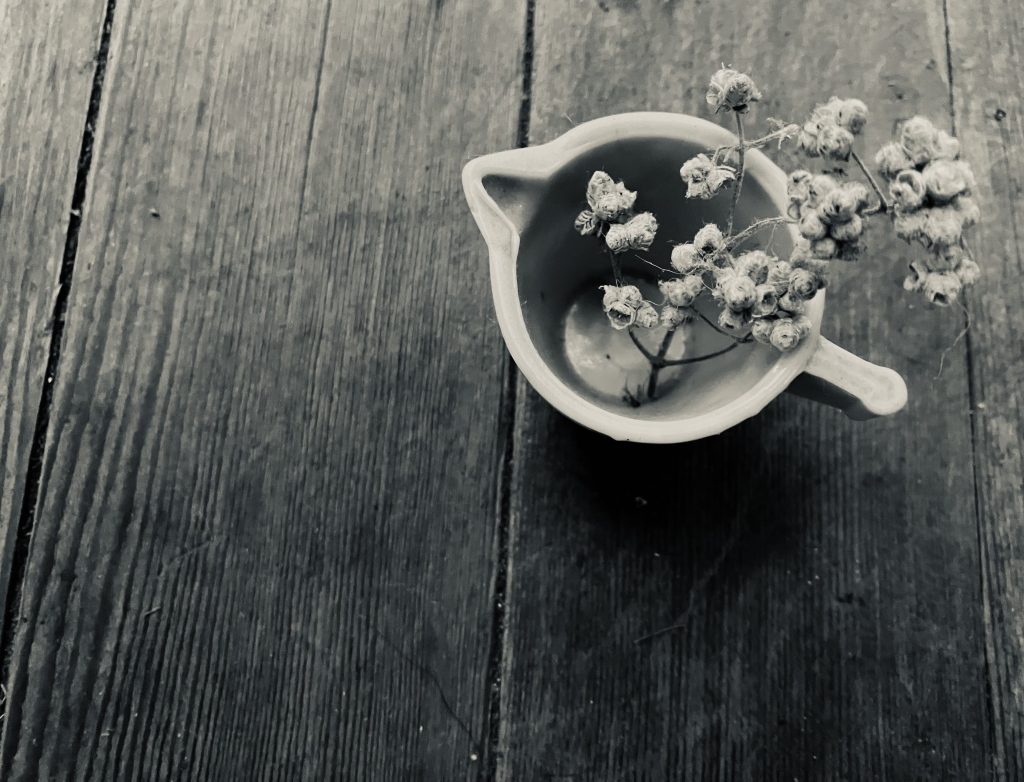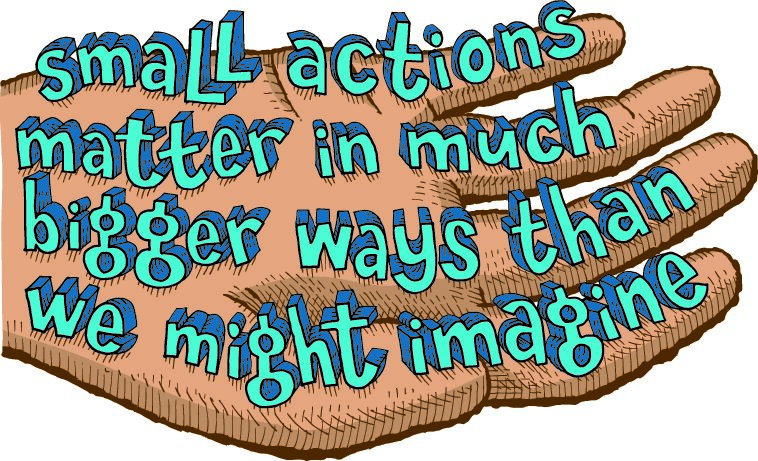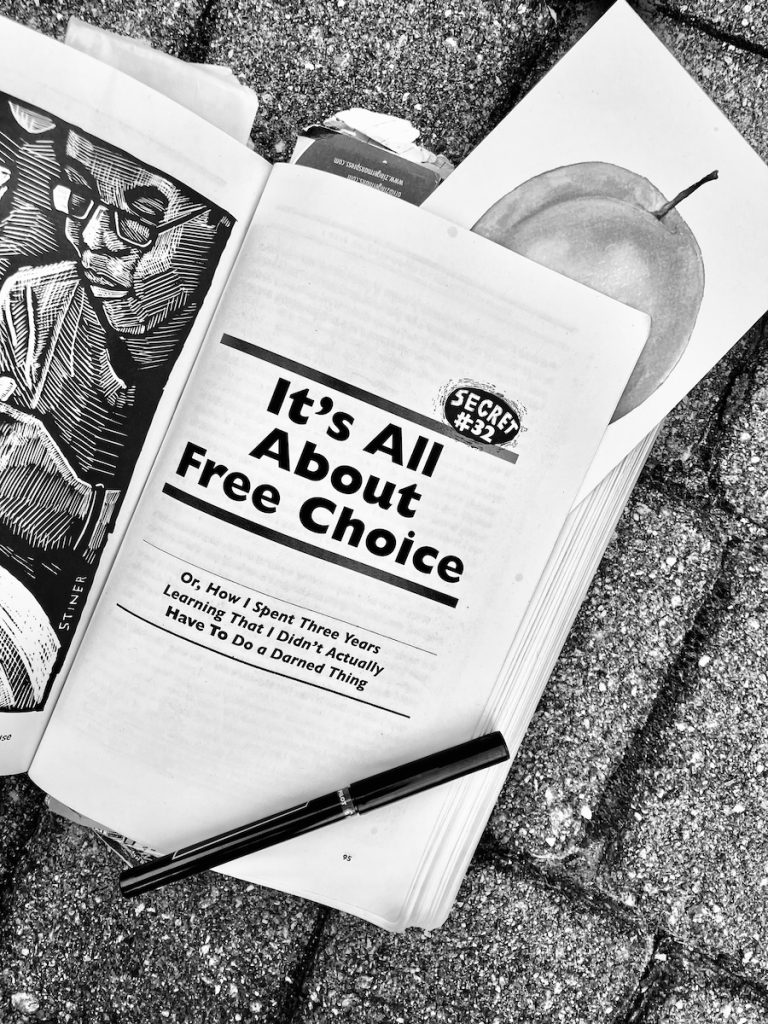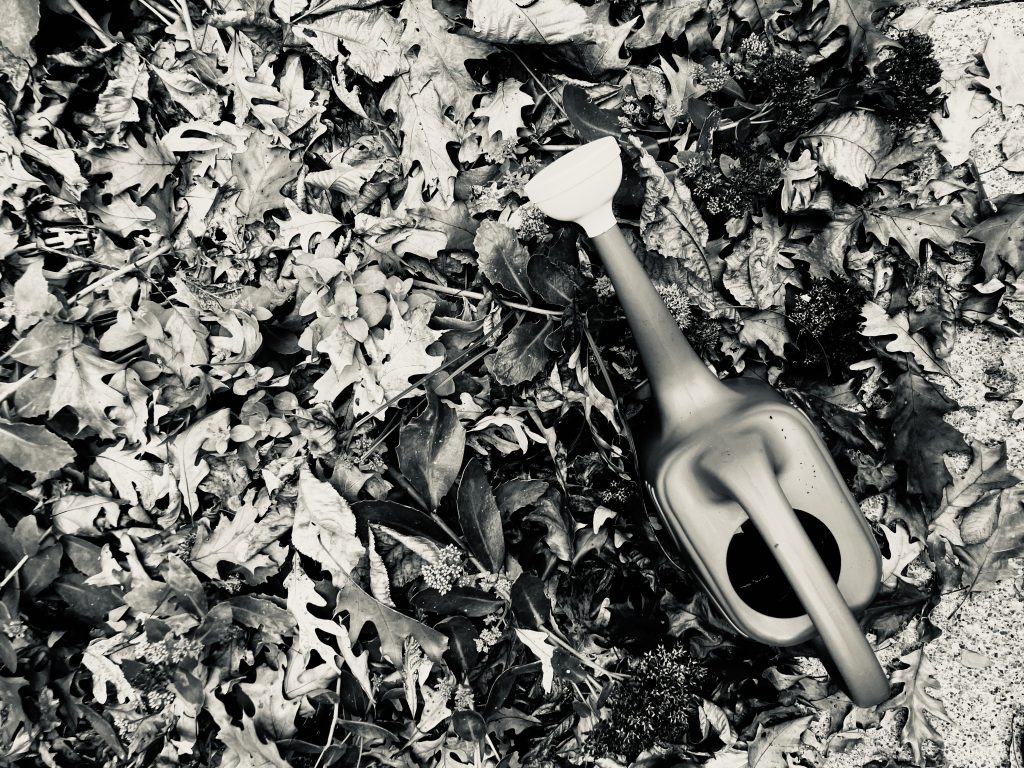Small Actions Matter in Much Bigger Ways Than We Might Imagine

Pint-sized ideas, the struggle of self-doubt, and learning to take action anyway
In an interview on the On Being podcast last summer, author and activist adrienne maree brown said something that’s stuck with me ever since I first heard it. Although I often feel the pressure to find “big” solutions, brown reminded me that there’s “something about smallness.” Grand sweeping plans sound, well, grand, but long-term greatness so often comes, instead, from small and well-intended actions. We may feel uncertain when we take small steps, and they’re rarely really glamorous, but over time, they do make a difference. Instead of waiting for the grand sweep of history to have its way with us, these sorts of small actions are more like whisk brooms we hold in our hands. On their own, they seem insignificant, maybe even a bit silly. Over time, though, they get the job done far more effectively than many might imagine. Perhaps most importantly, they’re the kind of things we can get moving on without waiting for the bigger world to show its hand. Running inclusive, dignity-centered meetings, as I wrote last week, would be one of these actions. Making art might be another. They may seem, at first, to be far too small to matter, but these small positive acts of resistance engage the people around us in quietly meaningful ways. Small stuff, I remind myself regularly, can add up to make a really big difference.
Maybe you can relate. Throughout my work life, I have very regularly felt like I’m falling short. Like we’re faced with big challenges—both at work and in the larger world—and like I’m not doing anywhere near enough. Thankfully, I’ve had enough therapy and have done enough work on my beliefs that I know better—on an intellectual level at least. I know how to reground, to reassure myself that this is only a feeling. I often remind myself that even though what I’m working on may not feel like it will be that impactful, it is, nevertheless, far more significant than my deeply rooted fears might lead me to believe.
As I look at the enormity of our greater ecosystem’s challenges right now—the increase in the number of autocratic actions around us and the accompanying diminishment of democracy—I keep coming back to this thought about the size of our actions. When I feel self-doubt, the smallness of my own actions, or the seeming insignificance of these actions in the scheme of the big world, I consider, for a minute or two, not taking any action. Then I repeat what has become something of a mantra for me of late: “It’s a small thing, but it’s something.” Uncertainty, in my head at least, is almost inevitable. This is my encouragement to myself to take action anyway. I remind myself regularly of what author Rebecca Solnit writes: “History is full of small acts that changed the world in surprising ways.”
Whether we’re talking about organizational improvement, self-development, or resistance to autocracy, the truth of the matter is that big things almost always start small. Grand strategies sound great, but the reality of real-life change is that it’s mostly a series of small things. Each, on its own, can easily be ignored. If the initiator descends into self-doubt, the actions might never happen. This essay is an encouragement to act anyway, to look self-doubt in the eye, take a deep breath, and take positive action. What seems small, I have come to learn, is far bigger than we have been led to believe. As adrienne maree brown said in the On Being interview, “It’s all these small activities that we need to get great at if we want to actually have anything that would be a real democracy.”
On January 6, 2023, historian Timothy Snyder posted a piece reflecting on what had happened at the Capitol two years previous. As he points out, had a few people taken action instead of staying on the sidelines, the story in the months that followed might have played out very differently. Snyder’s main message gives me solace when I’m struggling, feeling like I’m failing when I don’t find “big,” clear answers or determine which large, decisive actions will resolve most of our issues at work and beyond. When I’m starting to slip into self-doubt, I come back to what Snyder wrote 21 months ago:
A tiny bit of courage, a tiny bit of truth, can change history.
Looking at the magnitude of the issues all around us, it’s easy to feel irrelevant, insignificant, defeated. As adrienne maree brown writes, “The crisis is everywhere, massive massive massive. And we are small.” Still, brown is clear: “starting small” is an excellent antidote to overwhelm.
If you do feel overwhelmed, know that you are not alone. Last weekend, journalist Katie Couric asked Jill Lepore, a professor of American history at Harvard, to assess the state of our nation as autocracy seems to increase its reach with each passing week. After all, Lepore had just done several weeks of book events across the U.S. . Unfortunately, her answer was not very uplifting. People around the country are “defeated, confused—there’s a great sinking feeling.”
I am not a psychologist, but I’m pretty sure that this cannot be a good thing. When people who work in a business, or any organization, believe they’re about to lose, they are almost certain to self-fulfill into the failure they have already imagined for themselves. I am determined not to descend into feeling defeated. If ordinary people like me won’t take action, who will? Which is, in great part, what’s pushing me to stick my neck out and make the newly available “Apricots for Dignity and Democracy” t-shirts. They feature a lovely scratchboard drawing by Ian Nagy and are produced by Underground Printing here in Ann Arbor. We’re donating the proceeds to the non-partisan, nonprofit news organization Democracy Now! In the grand scheme of things, it sure seems small. But, still, I remind myself, it’s something.
The voice in my head that keeps telling me that I ought to be able to come up with “big,” bold solutions is just another self-doubting, anxiety-centered way to arrive at inaction. When I struggle with it, and when Timothy Snyder’s quote doesn’t shift my energy from worrying to getting down to work, I turn back to adrienne maree brown. Her 2017 book, Emergent Strategy, is one of my favorites of the last eight years. In it, she is very clear that the little things are ultimately what make the biggest difference. It’s not about the “next big sale” or finding “hiring the perfect manager” or hitting the business equivalent of a hole-in-one with our next new product. The first item on brown’s “Principles of Emergent Strategy” list sends the same message loud and clear:
Small is good, small is all.
In a conversation with her sister Autumn on the How to Survive the End of the World podcast, brown noted that, sure enough,
If I take my mind off of the massive crisis and bring it down to the small thing that I can care about, there’s magic, and it’s available right now. What we practice at the small scale sets the patterns for the whole system.
Eventually, brown’s wise words help me work my way back to reality. My anxiety and sense of helplessness may be big, but the little things still matter. A small “extra mile,” like bringing a first-time guest a taste of something they didn’t ask for, helps them to feel welcome. Sending a regular customer home with one of our “newly improved by the addition of Vermont Creamery Cultured Butter” croissants could make their day. Or emailing a ZingTrain client I haven’t heard from for a while, just to see how they’re doing often turns out to offer some surprisingly timely support. None of these actions alone will fix our national issues or even all of our challenges here in the Zingerman’s Community of Businesses (ZCoB). But they do, as Timothy Snyder and adrienne maree brown remind me, make a difference.
What seems slightly silly, awkward, or both might bring about awe and have great significance. The thing is, there’s really no way to know when we take those first steps. A second chance for a struggling employee could turn a life around. A donation to a new nonprofit could help it turn the corner. A phone call to a friend could help them in ways that go far beyond what we can know when we first dial their number. A small extra mile for a customer late on a Sunday evening can, I know from experience, open a window that will develop into a significant, long-term relationship. Stopping to chat with a coworker who’s having a hard day can offer a bit of care and comfort that, at the time, we didn’t have a clue was sorely needed.
I work hard to remember that what we perceive as irrelevant today could become enormously inspiring two or three years down the road. The other day, I gifted a copy of our personal visioning pamphlet to a ninth grader who was anxious about starting high school. I shared that I wish I’d known about visioning when I was his age. The odds are high that I’ll never know if he reads it. Snyder and brown remind me to do these small things anyway.
Some small actions can turn out to help even more quickly than might have hoped. Bridgette Carr—University of Michigan law professor, co-director of both the AI Law and Policy Clinic and the Human Trafficking and Immigration Clinic, and longtime Zingerman’s customer—reached out to tell me that last week’s e-news, about the import of leading dignity-centered and inclusive meetings, had a huge impact on her and the departments she leads. She forwarded the essays to a host of colleagues. Deep conversations have commenced, and these folks have already begun working to make their meetings better! Her clients—and the community and the country—will all feel the impact as she and her team improve the effectiveness of their incredibly important work.
In other instances, it may take years to realize what our seemingly small, almost irrelevant, actions inspire. My research for “A Revolution of Dignity in the Twenty-First Century Workplace” made this all too clear. I’ve shared this story many times, but it sums up beautifully the significance of small actions. It also reminds me that what seems like a tiny, uncertain action could actually start a revolution.
In 2013, Mustafa Nayyem, then a 32-year-old Afghan-Ukrainian journalist, took a small step that turned out to have a huge national impact. Nayyem’s father had been a progressive teacher in Afghanistan. He escaped when the Taliban came to power, bringing Nayyem and his younger brother, Masi, to Ukraine. Nayyem arrived there in 1990, becoming an awkward immigrant at age eight. By 2013, he had established himself as an effective and progressive journalist, but he was not a well-known national leader.
On November 21, 2013, the Russian-sponsored president of Ukraine pulled the plug on a long-promised agreement with the European Union, one that was supposed to connect Ukraine more meaningfully with Europe. Hopes in Ukraine, especially among young people, had been high. The sudden switch in national direction dashed those hopes, and drove many into deep despair. Many Ukrainians, I’m sure, were miffed. I’d imagine they felt much like the Americans that journalist and Harvard professor Jill Lepore referenced above. Mustafa Nayyem, though, decided to do something. It was a small thing, but it was something.
Late on that cold night—it was in the mid-30s in Kyiv—Nayyem posted on Facebook:
Come on, let’s get serious. Who is ready to go out to the Maidan by midnight tonight?
Wisely anticipating what many would do in response, he added:
“Likes” don’t count.
Although I agree with Rebecca Solnit that it’s difficult to really decide exactly where any particular story gets started, Nayyem’s simple Facebook post could well have been a cultural and historical turning point. Looking back now, it seems like a key moment in beginning what became, three months later, the Revolution of Dignity in Ukraine.
My point here is not that Mustafa Nayyem is some sort of magical superhero. He was just another caring, competent person who was concerned about the state of his country. Instead of retreating into indifference, as many others would have, he leaned in and decided to take a small action. When he made the post, Nayyem may have anticipated that a few dozen of his friends would show up on the Maidan, bundled up to protect themselves from inclement weather, and that this gathering would have been the end of it. Instead, Ukraine found its footing in a philosophy rooted in dignity and democracy. This belief is core to the country’s 21st-century being.
Two years ago, friend and writer Gareth Higgins taught me that it’s impossible to know how the story of a small action will play out over, say, the next 10 years. In other words, we need to take action without any assurance of impact. The idea of which brings me back to a lesser-known story from the life of Mustafa Nayyem.
In January 2023, Nayyem became head of Ukraine’s War Reconstruction work, repairing roads, buildings, and bridges as quickly as possible after Russian drones and rockets destroyed them. That summer, his brother Masi, fighting on the front, was badly injured. He lost his left eye, but it could have been much worse had his Nayyem not made headway so quickly with the road repairs. As Nayyem explained, Masi “was delivered to the hospital by a road which we had repaired previously, and he was delivered in two hours. Before the repair, it took four or six hours, and he would not have survived.”
The unexpected significance of Nayyem’s work on Ukraine’s roads also brings to mind the story of Bobby Cain, who passed away last week at the age of 85. Back in 1957, he was a high school student in a small town near Knoxville. When the Brown v. Board of Education ruling came down from the Supreme Court, he was a 14-year-old kid living in the Black neighborhood of Clinton, Tennessee. Two years later, Cain and 11 other Black teenagers from his town were bused to what had always been an all-white school. They suffered both verbal and physical abuse from other students, being beaten, provoked, and put down continually throughout the year. Cain could have opted to quit. It would’ve been an easy decision, I think. His impact in the school, on its own, probably seemed small. He was just another high schooler struggling to get through his final year before applying to college. But by sticking it out, Cain ended up making a mark. He became the first Black student to graduate from a public high school in an integrated setting in the American South. The impact of Cain’s isolated act of courage changed the course of history.
Mustafa Nayyem and Bobby Cain’s small actions turned out to be significant, but it’s only years later that they, or anyone else, would realize their historical import. In the moment, they were just two people trying to figure out if they should take action in the face of uncertainty and adversity. All of which brings me back to an inspiring talk the Indian philosopher Krishnamurti once gave 75 years ago. On February 5, 1950, seven years before Bobby Cain changed high schools, Krishnamurti addressed a crowd in Madras, which is in the south of India. That afternoon, the 55-year-old philosopher summed up what Timothy Snyder and adrienne maree brown have shared, and what Mustafa Nayyem, Bobby Cain, and hundreds of ZCoB staff members have demonstrated in down-to-earth, real-life ways that turned out to be far more meaningful than expected:
The revolution must begin with each one of us and not with external, environmental influences. … All great things start on a small scale, all great movements begin with you and me as individuals.
Rebecca Solnit has shared a related point that’s of equal import: “Nobody can know the full consequences of their actions.” In his Beyond the Brand podcast, Bryan Elliott thanked author and marketing maven Seth Godin for giving some great advice along these lines. Anxious and frustrated that his work was not taking off, Bryan reached out to Seth. Though Seth could have smiled and nodded and simply encouraged Bryan to keep going, he responded with surprising directness. As Bryan recalls, Seth said:
Bryan, there’s no Prince Charming in this story. There’s no rescue boats. No one’s coming. Stop waiting to get picked.
On air and with tears in his eyes, Bryan shared how much Seth’s simple statement meant to him: “That just pierced my heart like no other, and in that moment, my whole point of view changed.”
What Seth said to Bryan is a good reminder for me, and maybe for you. Whether it’s about the state of our companies, the quality of the energy on a shift we’re working, or the state of the country around us, no one is coming to save us. It’s up to us. Take a chance. Lean in. Speak up. Big things might well come of it.
This understanding of small actions’ significance also shows up in academic settings. Back in the winter of 1984, we were closing in on our second anniversary in business at the Deli. A few miles southeast, Karl Weick, then a professor at the U of M business school, published a paper in American Psychologist. It highlighted what he called “the import of small wins”:
By itself, one small win may seem unimportant. … Once a small win has been accomplished, forces are set in motion that favor another small win. When a solution is put in place, the next solvable problem often becomes more visible. This occurs because new allies bring new solutions with them and old opponents change their habits. Additional resources also flow toward winners, which means that slightly larger wins can be attempted.
This paper was one of many dozens that Weick, who’s about to turn 89 years old, published over the course of his career. It may have seemed unremarkable at the time, but it was anything but. Fast Company co-founder Bill Taylor says that Weick’s paper is now a “landmark.” The message is clear: Don’t assume that “big” solutions are all that matter.
Even within our own organizations, we often don’t realize how meaningful our work can be. Creating a strong organizational culture—one that helps people believe that the little things they do will make a difference—can have a big impact. A guest who runs a business of his own on the other side of the country shared with me how great a visit to Ann Arbor had been. He’d brought along his entire leadership team. To convey to his crew what ZCoB culture is about, he asked their server at the Roadhouse to share her story. She related that she’s been here for over 20 years. Aware that high turnover is typical in the food business, he asked her why she’d stayed so long. Knowing how quiet she usually is, I was curious to hear what she’d said. Her answer took my breath away: “Because I have agency.” It’s true. Here in the ZCoB, she really does have the power and authority to take action to improve her guests’ experiences. She doesn’t have to wait for a thumbs-up from on high. Her response is a great reminder that, awkward or uncomfortable as it may be to take action, the rest of us also have agency. If—and it’s a big if—we opt to use it, that is.
So, what can we do with these points about small actions’ big impact? Maybe we should take a cue from The Ark, Ann Arbor’s much-loved, longstanding folk music venue. It’s the home of “Take a Chance Tuesdays,” a series of performances by little-known acts. I like the idea of creating a little and maybe silly ritual to encourage people to take small, positive actions in the face of self-doubt. Perhaps every Tuesday, we all decide to take a chance on some small idea that we liked, one that self-doubt might well have led us to pass on.
If you give this technique a try, let me know what happens. What you do might just end up changing the course of history. So take a chance, try something, get moving. Resistance, change, the future, starts with us. As Timothy Snyder says, “It is important to take action, even in a small way, every day.”
One more small thing to add to the story: When I’m deep in doubt and need some emotional backup for Timothy Snyder and adrienne maree brown, I like to call up a little humor. This line from the Dalai Lama makes me laugh:
If you think you are too small to make a difference, try sleeping with a mosquito.
P.S. I’ll be co-teaching ZingTrain’s Zingerman’s Experience seminar on Wednesday and Thursday, October 16 and 17. I think it’s the best place to get a deeper understanding of the myriad small things that make the ZCoB ecosystem what it is. Great learning, great people, great connections, and, of course, a whole lot of great food. Hope to see you there!



